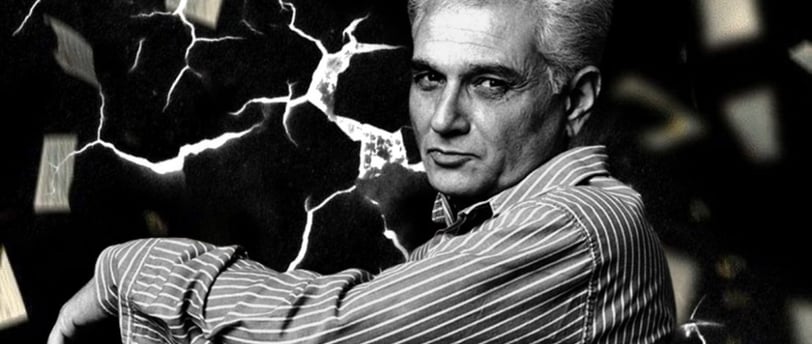Can We Really Trust Language to Tell the Truth? Derrida and Deconstruction
Have you ever wondered if the language we use every day is as stable as we think it is? Jacques Derrida certainly did. He proposed that language is not a reliable vessel of truth, but rather a dynamic and shifting medium that constantly evolves. This idea, at the heart of Derrida's deconstruction, challenges centuries of philosophical certainty. It opens up a world where meaning is fluid, constantly deferred, and never truly fixed. This might sound unsettling, but it also offers a fresh perspective on how we perceive reality and truth.
Mohammed Khalil Ghlimi
12/21/20244 min read


Derrida and Deconstruction: Can We Really Trust Language to Tell the Truth?
Have you ever wondered if the language we use every day is as stable as we think it is? Jacques Derrida, a revolutionary thinker, certainly did. He proposed that language is not a reliable vessel of truth, but rather a dynamic and shifting medium that constantly evolves. This idea, at the heart of Derrida's deconstruction, challenges centuries of philosophical certainty. It opens up a world where meaning is fluid, constantly deferred, and never truly fixed. This might sound unsettling, but it also offers a fresh perspective on how we perceive reality and truth.
The Fragile Game of Language
Language is like a game of Jenga, where each word is a block that could topple the entire structure. Derrida’s deconstruction theory dives deep into this instability. He argues that words don’t have inherent meanings; their meanings change based on context and interpretation. Think about it: the word "tree" brings different images to mind depending on whether you’re thinking of a Christmas tree or a tree in the Amazon rainforest. Derrida takes this idea further, showing that the relationship between words (signifiers) and their meanings (signifieds) is always in flux. This constant play of differences, which he calls "différance," challenges the traditional idea that language can capture an absolute truth.
Drawing on Saussure's theory of the sign, Derrida points out that the connection between a word and its meaning is arbitrary. While Saussure argued that signifiers and signifieds are tied, Derrida highlights their fluidity. Signifiers are always in a state of deferral, transforming into signifieds, creating an endless chain of meanings. According to Derrida, meaning is dictated by the differences between words within the language system. He argues that language operates through a play of differences, where meaning is generated not by what is present but by what is absent. This idea, différance, directly challenges the stability of meaning in Western thought, which seeks to ground meaning in a stable origin, such as a speaker's intention or a transcendental signified.
Jean Jacques Rousseau embodies this idea in his writings, expressing a longing for a primitive and innocent nature. Derrida calls this logocentrism—the Western tradition’s reliance on presence, immediacy, and self-expression, often associated with speech. Speech is seen as closer to thought and truth, while writing introduces the absence of the speaker, exposing meaning to deferral and reinterpretation. Derrida critiques logocentrism and the metaphysics of presence, which relies on a stable, self-evident origin.
Breaking Down Binary Oppositions: Who’s Really in Charge?
Western thought is deeply embedded in binary oppositions. These pairs of opposites, such as male/female, reason/emotion, or good/evil, often establish a hierarchy where one term is privileged over the other. Derrida exposed how these oppositions are unstable and how the supposedly subordinate term is often essential to the dominant one. Deconstruction seeks to destabilize these oppositions by showing they are interdependent and mutually contaminating, as the privileged term relies on the supposedly inferior term for its meaning. For example, Derrida demonstrates how speech relies on writing and how writing reveals the instability of meaning in all language. Deconstructing binary oppositions doesn't aim to destroy the hierarchy but to scrutinize it, revealing its instability, thereby challenging traditional thought and opening new possibilities for understanding.
Metaphors Rule Our World: Hidden Politics in Words
Metaphors are fundamental to language, shaping thought and knowledge. Traditionally considered decorative, metaphors transfer meaning between domains, much like the interplay between signifiers and signifieds. Both Derrida and Nietzsche argue that all language is inherently metaphorical. This insight reveals how metaphors influence political and social structures. For example, framing arguments in terms of attack and defense reflects a metaphorical view of debate as combat. By critically examining these metaphors, Derrida shows how language shapes perceptions of power, conflict, and social relations.
Criticism
Derrida’s work is not without criticism. A prominent critique of deconstruction is its tendency toward relativism and nihilism. By arguing that meaning is always deferred and contingent, deconstruction challenges the idea of objective truth or stable meaning. This undermines the foundation of shared understanding and rational discourse. For instance, in contexts like science, law, or ethics, where clear principles and truths are necessary for decision-making, deconstruction's emphasis on instability can be seen as impractical and counterproductive. Furthermore, by exposing the instabilities in language and systems of thought, deconstruction often dismantles established structures without offering alternatives. This has led critics to view it as a destructive approach, tearing down traditional ways of understanding without building anything in their place.
A Call to Rethink Meaning
Derrida’s theory challenges the Western philosophical reliance on stable meanings, binary oppositions, and the privileging of speech over writing, offering a more fluid and flexible understanding of language. Through his exploration of the instability of language, logocentrism, binary oppositions, and the political implications of metaphor, Derrida invites a radical reconsideration of how meaning is constructed and understood.
Q&A
Q: What is Derrida's deconstruction?
A: Deconstruction is a philosophical approach developed by Jacques Derrida that critiques and analyzes the hidden assumptions, contradictions, and hierarchies within language and thought. It reveals that meaning is never fixed but constantly deferred, challenging traditional notions of stability and certainty in language.
Q: How does Derrida's deconstruction challenge traditional Western thought?
A: Derrida's deconstruction challenges traditional Western thought by exposing the instability of language, critiquing logocentrism (the preference for speech over writing), and destabilizing binary oppositions (such as male/female, reason/emotion). It reveals how these structures are interdependent and mutable, rather than fixed and hierarchical.
Q: What is différance in Derrida's theory?
A: Différance is a key concept in Derrida's theory that refers to the idea that meaning is generated through the differences between words within a language system. It highlights the fluid and deferred nature of meaning, suggesting that meaning is not present in the words themselves but is constantly shifting and evolving.
Q: Why is deconstruction criticized for leading to relativism and nihilism?
A: Deconstruction is criticized for leading to relativism and nihilism because it challenges the notion of objective truth and stable meaning. By emphasizing the instability and contingency of meaning, deconstruction undermines the foundation of shared understanding and rational discourse, which can be seen as impractical in fields like science, law, or ethics.
Q: How does Derrida's deconstruction relate to metaphors in language?
A: Derrida's deconstruction relates to metaphors in language by highlighting that all language is inherently metaphorical. Metaphors transfer meaning between domains and shape thought and knowledge. Derrida shows how metaphors influence political and social structures, revealing the hidden politics in words and how language shapes perceptions of power and social relations.
